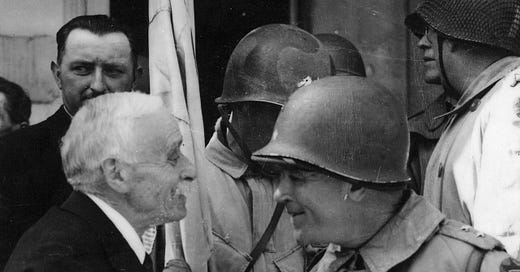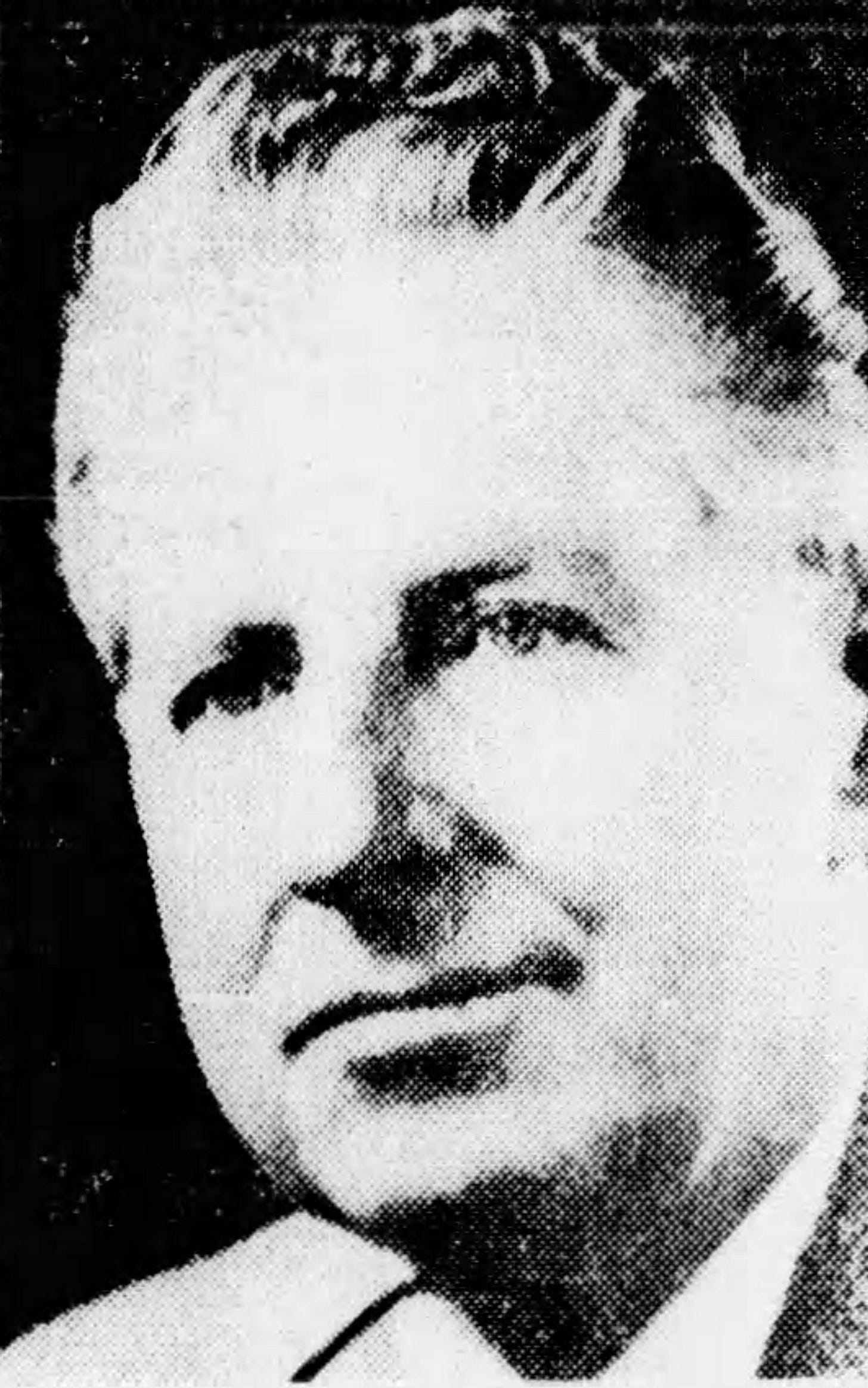Cy Peterman and the liberation of Cherbourg
The scene Ivan “Cy” Peterman described in his story filed to the Philadelphia Inquirer on June 27, 1944, might as well have been a sequel to Casablanca.
ATLANTIQUE HOTEL, Cherbourg, June 27 — There was a slight tremor in the voice of Monsieur le Mayor, Paul Reynaud, at 4 o’clock this afternoon when he stepped in front of a small platform in the Place de la Republique. Monsieur the Mayor was receiving back the keys to Cherbourg, the first large freed city of liberated France. …
It was an historic thing and the few who saw it will always remember the scene. There were 250 American soldiers — dirty, grim, red-eyed from the terrific siege of the last week — clothed in new G.I. pants and jackets with clean shaves for the first time in days. There were about the same number of French civilians, likewise haggard and unkempt from the ordeal inside the battered city. …
The ceremony was held on the steps of the Hotel de Ville, or city hall, which was draped with bunting for the occasion. As it began, a martial band played — first with the Marseillaise, then with God Save the King, then the Star Spangled Banner — with the crowd bareheaded and with tears rolling down many cheeks. Soldiers and officers stood smartly at attention, grimly serious.
Peterman described in brief the ceremony, featuring speeches from the reinstalled mayor and the man whose troops made it possible, Maj. Gen. J. Lawton Collins of VII Corps, before dropping in a personal note:
The sun shone brightly through light clouds during the speeches, flashing reflections from the blue harbor, as Allied planes with their zebra stripes reassuring us of their identity droned overhead.
But there were some whose faces were studies: those resolute Frenchmen, some biting their lips to hold back their emotions, some staring as if not believing what they were hearing, some with hands clasped as if in thankfulness, and others merely drinking in every syllable of freedom’s announcement — those things were to be remembered always from this, my first day in France.
Exactly three weeks after the invasion forces had landed east of Cherbourg, Peterman had finally reached the continent. A veteran of the North African campaign, where he had been awarded a Purple Heart the year before after suffering a broken arm and other injuries when his jeep crashed near El Guetar during a German air attack, the 46-year-old correspondent had been biding his time in London before securing passage across the Channel.
He finally reached Cherbourg just as the Allies solidified control of the battered port city — a declaration made official at 7:16 a.m. on June 27. Once Peterman settled in and covered the formal proceedings, he set out to get the lay of the land.
A follow-up story two days later repeatedly compared the local terrain to that around Chattanooga, Tennessee — curious, since Peterman was a Wisconsin native writing for an audience in Philadelphia, where he had lived for 20 years.
Whatever his reasoning behind drawing that comparison, Peterman did hit on a key point in the crumbling enemy resistance in Normandy.
If the Germans had fought here as they did at El Guetar, Mateur or Cassino, unquestionably the battle still would be raging for this terrain — so reminiscent of that between Chattanooga and Atlanta, with red clay shelves and heavily underlaid rock and dense undergrowth — is ideal for the German style of warfare.
But the secret is that the Germans of today are not the Nazis of last year or of four years back; the variety of prisoners reveal this fact. As one staff officer at American headquarters put it tonight, “There is a missing generation in Germany now. It’s under the sod. Instead we have kids and middle-aged burghers. And this week we picked up one in the anti-aircraft forces who was 69, well past the military age of effectiveness.
The correspondent would follow the European war to its conclusion — which at the time of the Cherbourg liberation was not yet entirely clear.
Some 10 months later, though, Peterman ehibited only exhaustion with the entire enterprise as he wrote from inside Germany on May 3, a day after a visit to liberated Buchenwald.
This terrible apathy gets you down after a while. It gets you down because by now you know that waiting, too, is meaningless. There is so little ahead for so many.
There is so little vision left in Europe’s common herd, you see. Freedom after 13 years under Hitler’s Nazis hasn’t restored the spirit of so many living dead who wander like men released from a dark cavern, confused by the light.
Instead of concern over the restoration of their respective nations, they’re interested mainly in begging, stealing, somehow being provided with food, a place to sleep and reasonable assurance they won’t be shot before tomorrow. Life in this period of shock — all Middle Europe acts today like survivors of a train wreck, sitting dazed amid its wreckage — is reduced to fundamentals.





